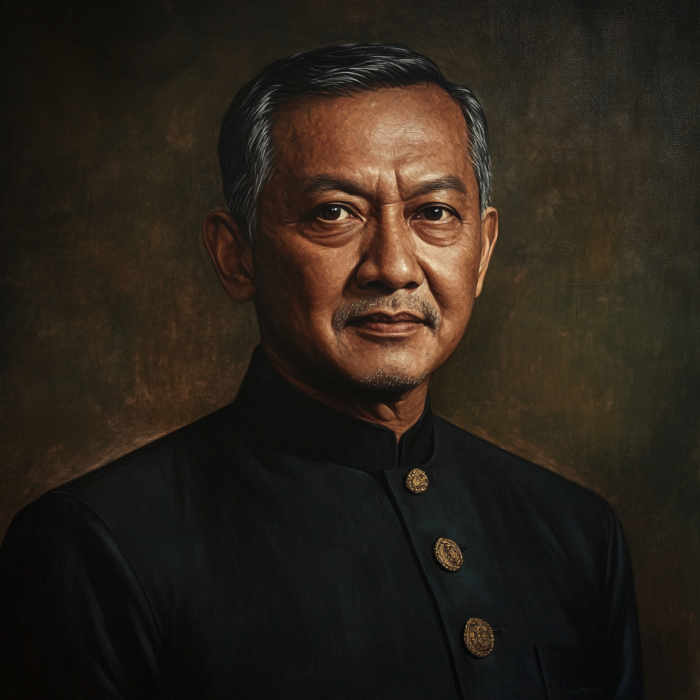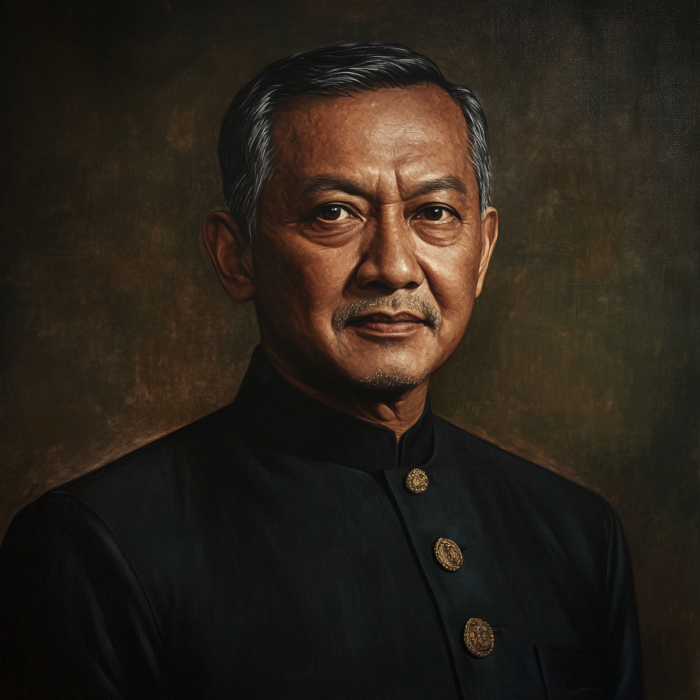


Prem Tinsulanonda (1920–2019) was a Thai military officer, statesman, and influential political figure who served as Prime Minister of Thailand from 1980 to 1988. He was a key figure in Thai politics for decades, known for his role in stabilizing the country during turbulent periods and fostering economic development. After his tenure as prime minister, Prem continued to hold significant influence as the President of the Privy Council, where he became a close advisor to King Bhumibol Adulyadej and played an important role in shaping the modern Thai monarchy. Prem’s legacy is marked by his dedication to political stability, his pragmatic leadership, and his central role in Thailand’s military and political elite.
Birth and Family Background: Prem Tinsulanonda was born on August 26, 1920, in Songkhla Province in southern Thailand. He came from a modest family; his father, Luang Winittantagum, was a medical doctor. Prem’s early life was shaped by his military education, which laid the foundation for his later rise in the military and political ranks.
Military Education and Early Career: Prem attended the prestigious Chulachomklao Royal Military Academy, the leading institution for military education in Thailand. After graduating, he embarked on a military career, gradually rising through the ranks. During the 1950s and 1960s, Prem held various command positions within the Thai military, earning a reputation as a disciplined and capable officer. His military service also allowed him to build connections with influential figures within the Thai armed forces, a key source of political power in the country.
Involvement in Politics: Prem’s military background eventually led him to politics. By the 1970s, Thailand had experienced multiple coups and political upheavals, and the military continued to play a dominant role in governance. Prem’s political career gained momentum when he was appointed to various ministerial posts, including Deputy Interior Minister and Defense Minister. His moderate and pragmatic leadership style helped him build relationships with both military and civilian leaders.
Appointment as Prime Minister: In 1980, Prem Tinsulanonda was appointed Prime Minister of Thailand by the National Assembly, largely due to his reputation as a steady and unifying figure who could manage the tensions between the military and the growing demands for democratic reform. Prem’s leadership came at a critical time, as Thailand faced internal political instability, an ongoing communist insurgency, and regional challenges stemming from the aftermath of the Vietnam War.
Pragmatic Leadership and Economic Development: As prime minister, Prem implemented a pragmatic blend of policies that focused on economic growth, military stability, and political compromise. He worked to stabilize the economy, promote rural development, and attract foreign investment, helping Thailand achieve substantial economic growth during the 1980s. Under his leadership, Thailand’s export-driven economy began to flourish, leading to rapid industrialization and integration into the global economy.
Prem’s government also emphasized rural development, continuing the work initiated by King Bhumibol’s projects aimed at alleviating poverty in Thailand’s countryside. His administration improved infrastructure and expanded access to education and healthcare, helping to narrow the gap between urban and rural areas.
Counterinsurgency and Military Role: One of Prem’s key challenges as prime minister was managing the ongoing communist insurgency in Thailand, particularly in the northeast and southern regions. Prem employed a combination of military force and political reconciliation to suppress the insurgency. His policies, which included granting amnesty to former communist fighters and integrating them into society, ultimately helped to weaken the insurgency and bring an end to the armed conflict by the mid-1980s.
Political Reforms and Civilian Rule: While Prem was a military man, his government took steps to accommodate democratic pressures. He introduced limited political reforms, allowing for more civilian participation in government. Though his regime was supported by the military, Prem carefully balanced military interests with growing demands for democracy, preventing large-scale confrontations between pro-democracy activists and the military. His leadership helped lay the groundwork for a more stable political environment in Thailand.
Surviving Coup Attempts: Prem’s tenure as prime minister was marked by several coup attempts by factions within the military who were dissatisfied with his governance. Despite these challenges, Prem managed to retain control and prevent the coups from succeeding, thanks to his strong alliances with loyal military officers and support from the monarchy. His ability to survive multiple coup attempts further solidified his reputation as a skilled and resilient leader.
Stepping Down: In 1988, after eight years in office, Prem decided not to seek re-election and stepped down as prime minister. His decision to leave office voluntarily was seen as a rare act in Thai politics, where military figures often clung to power. He was succeeded by Chatichai Choonhavan, marking the beginning of a period of civilian-led governments in Thailand.
Advisor to King Bhumibol Adulyadej: After stepping down as prime minister, Prem was appointed President of the Privy Council in 1988, a prestigious position that made him a key advisor to King Bhumibol Adulyadej. In this role, Prem became an influential figure behind the scenes, helping to shape royal policy and maintain the monarchy’s role as a stabilizing force in Thai politics.
Key Role in the 1992 Political Crisis: One of the most significant moments in Prem’s post-prime ministerial career was his role in resolving the 1992 Black May political crisis. After a military coup in 1991 led by General Suchinda Kraprayoon, pro-democracy protests erupted in Bangkok, leading to violent clashes between protesters and the military. The situation escalated into a full-blown crisis, and Prem, along with King Bhumibol, intervened to mediate the conflict. The king’s televised meeting with military leaders and opposition figures, facilitated by Prem, helped defuse the crisis and led to Suchinda’s resignation, paving the way for democratic elections and civilian rule.
Stabilizing Influence in Thai Politics: Throughout the 1990s and 2000s, Prem remained a central figure in Thai politics, even though he no longer held a formal political office. His influence as President of the Privy Council ensured that he had a say in key political matters, particularly during periods of political instability. He was a strong advocate for maintaining the monarchy’s central role in Thai society and governance.
A Symbol of Stability: Prem Tinsulanonda’s long career as both a military leader and a statesman made him one of the most influential figures in modern Thai history. His pragmatic leadership helped steer Thailand through a challenging period of political instability and economic growth. Though his time as prime minister was marked by his military background, Prem was also known for his efforts to promote democratic reforms and ensure the country’s stability.
Relationship with the Monarchy: Prem’s close relationship with King Bhumibol Adulyadej cemented his status as a trusted royal advisor. His role in preserving the monarchy’s influence in Thai politics, particularly during times of crisis, has earned him a respected place in the history of the Chakri Dynasty. His ability to navigate the complex relationships between the military, the monarchy, and civilian governments made him a key figure in maintaining Thailand’s stability for decades.
Criticism and Controversy: Despite his accomplishments, Prem’s legacy is not without controversy. Some critics argue that his prolonged influence, particularly his role in supporting military interventions in politics, contributed to the entrenchment of military power in Thailand. His involvement in supporting the military during the 2006 coup, which ousted Prime Minister Thaksin Shinawatra, drew criticism from those who viewed him as a figure perpetuating military dominance over democratic processes.
Death and National Mourning: Prem Tinsulanonda passed away on May 26, 2019, at the age of 98. His death was marked by widespread mourning in Thailand, and he was given a royal-sponsored state funeral. His passing marked the end of an era in Thai politics, as Prem had been a key figure in shaping the country’s political landscape for more than half a century.
Prem Tinsulanonda was a central figure in modern Thai history, known for his military leadership, his role as prime minister, and his long tenure as a key advisor to King Bhumibol Adulyadej. His pragmatic and stabilizing influence helped guide Thailand through periods of political turbulence, economic transformation, and regional challenges. Although his legacy is complex, with both achievements and controversies, Prem’s dedication to the monarchy and his efforts to balance military and civilian interests have left an enduring impact on Thai politics. His life and career are a testament to his skill as a leader, mediator, and statesman in a country marked by frequent political change.

We use cookies
We use cookies and other tracking technologies to improve your browsing experience on our website, to show you personalized content and targeted ads, to analyze our website traffic, and to understand where our visitors are coming from. Privacy Policy.